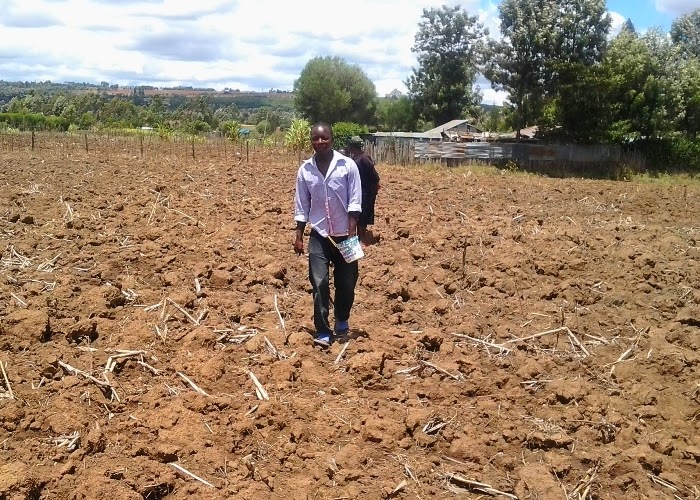By Bob Aston
The onset of the rainy season has
seen more farmers deciding on early planting. Elcy Kigano, Divisional Crop
Officer, Ministry of Agriculture, Sipili division said that planting season in
Sipili normally starts from 25th March to early April although this
season some farmers have opted to plant earlier than that.
Elcy said that rainfall has started
early this season. Most farmers have not yet done land preparation as they were
caught unaware. Elcy advised farmers to plant extra seeds to allow for losses due
to insect pests and ground squirrels.
Elcy also urged farmers to ensure that seeds are not directly in contact with fertilizer during planting, as this can cause poor germination due to seed scorching.
 |
| Peter Migwe at his farm |
Elcy also urged farmers to ensure that seeds are not directly in contact with fertilizer during planting, as this can cause poor germination due to seed scorching.
“Farmers should maximize crop production through appropriate
land-use management. They should also put in place soil conservation measures
to minimize environmental degradation,” said Elcy.
Data from Kenya Meteorological
service indicates that most of the rainfall over the better part of the country
is likely to be recorded during the peak month of April. Laikipia County is expected
to receive near normal rainfall with a tendency towards above normal. Cessation
dates of the long rain in the county is expected to be between 3rd
and 4th week of May.
Early planting ensures that crops can
be harvested before depletion of soil moisture as there will be less water loss
by evaporation. It will also ensure there is better response to fertilizer. Yields
are greatly reduced by late planting.
Peter Migwe who has been farming
maize and beans in a three acre piece of land said that he decided to plant
early in order to harvest early. Peter is among the few farmers in Sipili who
managed to buy the subsidized government fertilizer.
Most farmers in the region have opted to buy fertilizer from agro-vets. Fertilizer prices in most shops is retailing as high as Ksh 3,100 while the subsidized government fertilizer is retailing at Ksh 2,000.
James Mwai who also decided to plant early said that he could not wait for the government fertilizer as time was not on his side. He had decided to plant early but getting subsidized government fertilizer was a problem.
“I had wanted to get subsidized government fertilizer but it was not possible. I decided to buy in an agro-vet. It was costly as I had to part with Ksh 3,000 but I did not have any option,” said Mwai.
Mwai also decided to use DAP instead of 23.23.0 which he said is the most preferred fertilizer in Machunguru area and because he believes that it is reliable.
Most farmers in the region have opted to buy fertilizer from agro-vets. Fertilizer prices in most shops is retailing as high as Ksh 3,100 while the subsidized government fertilizer is retailing at Ksh 2,000.
 |
| Peter and his family planting peas |
James Mwai who also decided to plant early said that he could not wait for the government fertilizer as time was not on his side. He had decided to plant early but getting subsidized government fertilizer was a problem.
“I had wanted to get subsidized government fertilizer but it was not possible. I decided to buy in an agro-vet. It was costly as I had to part with Ksh 3,000 but I did not have any option,” said Mwai.
Mwai also decided to use DAP instead of 23.23.0 which he said is the most preferred fertilizer in Machunguru area and because he believes that it is reliable.
Despite some farmers deciding on early planting some have not
yet planted. Johnstone Ndegwa Ndiritu who has a tree nursery said that he
depends on sale of trees to buy farm inputs. Johnstone said that the onset of
the long rain and subsequent purchase of trees will enable him to start
preparing his farm for planting.
Last year Johnstone used 23.23.0 in a three quarter piece of
land to plant maize and he said that the returns were good as he managed to get
22 bags of maize. Previously he was using DAP and he was getting between 15-17
bags.
No comments:
Post a Comment